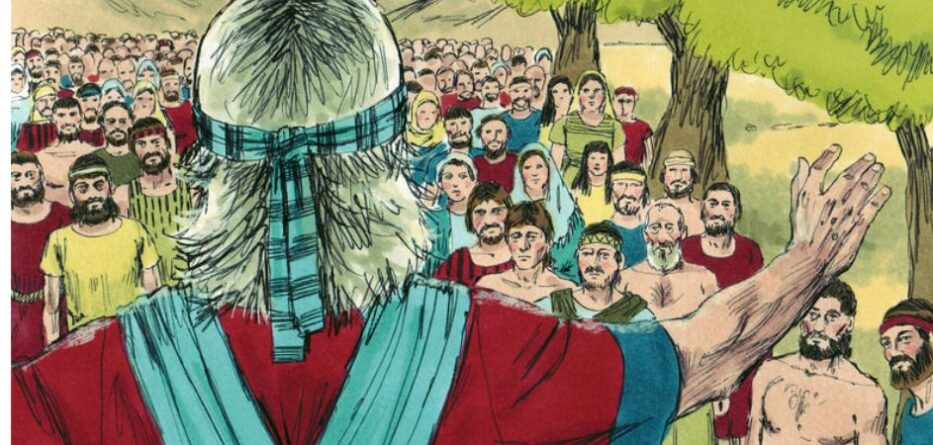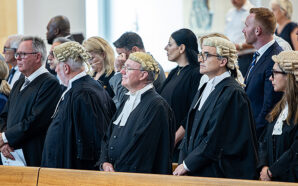Homily for the 21st Sunday in Ordinary Time, Year B
Social Justice Sunday
25 August 2024
Readings: Joshua 24:1-2a, 15-17, 18b; Ps 34:2-3, 16-17, 18-19, 20-21; Ephesians 5:21-32; John 6:60-69
Listen at https://soundcloud.com/frank-brennan-6/homily-25824
Today is Social Justice Sunday. Our bishops have produced a document entitled ‘Truth and Peace: A Gospel Word in a Violent World’. In today’s first reading, Joshua gives a choice to the elders and leaders of the tribes of Israel gathered at Shechem. They can choose whatever gods they like. They respond:
‘Far be it from us to forsake the Lord
for the service of other gods.
For it was the Lord, our God,
who brought us and our ancestors up out of the land of Egypt,
out of a state of slavery.
The Lord performed those great miracles before our very eyes
and protected us along our entire journey
and among the peoples through whom we passed.
Therefore we also will serve the Lord who is our God.’
Like those elders and leaders, we are on the brink, having to choose. Our God shows us the way to truth and peace. Other gods show the way to lies and violence. The social justice statement begins with an urgent note of doom and gloom, quoting Pope Francis who says: ‘A global ceasefire is urgent: either we do not realise it or we are pretending not to see that we are on the brink of the abyss.’[1]
The statement bemoans that ‘the fog of war has rarely been so thick and dark’. It asserts: ‘In the end there is no such thing as truth in a post-truth world; and if there is no such thing as truth, there is no such thing as a lie.’ According to the statement ‘without trust there can be no peace and certainly not the reconciliation which lies a step beyond peace. The grammar underlying (the) statement is that truth creates trust and trust creates peace.’ Building an architecture of peace, the bishops insist on the need for maintaining the rule of law, ‘a rules-based international order’ and a commitment to dialogue. Peace is the work of everyone and ‘we all need to act small but think big, to act locally but think globally’. ‘None of us speaks the whole truth, which is why truth speaking and peacemaking belong to the whole community.’[2]
The statement concludes with a quote from Pope Benedict’s message for World Day of Peace in 2006 when he said that ‘any genuine search for peace must begin with that realisation that the problem of truth and untruth is the concern of everyone; it is decisive for the peaceful future of our planet.’
Understandably the bishops don’t get into specifics. But if we Australians are to be truthful, pledging ourselves to the rule of law and ‘a rules-based international order’, we need to face the lack of candour and transparency involved with our last commitment to war, when we joined the USA in the invasion of Iraq in 2003 without approval from the UN Security Council. It was an unlawful invasion. Our government committed our troops to war in breach of the rules based international order. At the time there were some courageous lawyers who took a stand. For example Dr Gavan Griffith who had been the Commonwealth Solicitor General for 14 years stated: ‘The Australian and United Kingdom legal advices are entirely untenable. They are arrant nonsense. They furnish no threads for military clothes. It is difficult to comprehend that the fanciful assertions (they are not arguments) of the two advices have been invoked by Australia and the United Kingdom to support an invasion of another state.’[3] James Crawford and Hilary Charlesworth, the two outstanding Australian international lawyers who were later appointed as permanent judges of the International Court of Justice, signed letters opposing the war. James Crawford signed a letter stating:‘On the basis of the information publicly available, there is no justification under international law for the use of military force against Iraq.’[4] Hilary Charlesworth signed a letter stating: ‘The initiation of a war against Iraq by the self-styled “coalition of the willing” would be a fundamental violation of international law.’[5] At the time, James Crawford told a university audience: ‘I do not believe that Security Council resolution 1441 authorizes the use of force without a second resolution — either taken alone or in combination with much older resolutions concerning the Iraqi invasion of Kuwait. There is no imminent situation of self- defence, no imminent humanitarian crisis, and therefore no legitimate justification for the use of force.’[6] Sadly our government took no notice. When James died in 2021, he was described as ‘the pre-eminent international lawyer of our times’.
Some Christians are pacifists, believing that waging war is never justified. Professor Nigel Biggar, professor emeritus of moral theology at Oxford, makes the point: ‘Not going to war in 1994 was good for Britons and Australians, but not so good for the Tutsi in Rwanda: our staying at peace left the Hutu at peace to slaughter 800,000 of them. Peace, like war, is morally complicated.’[7]
Most of us believe that there is a case for war when we are threatened. For example, there can be no doubt that Israel had the right to wage war against Hamas in Gaza after the appalling terrorist attack on 7 October 2023. A legitimate government only goes to war for a just cause, with right intention, as a last resort. When prosecuting the war, you must act proportionately, using military means ‘apt to the military objective, causing only such damage — to combatants, non-combatants, and civilian infrastructure — as is necessary’. You must avoid the ‘intentional and disproportionate killing of civilians’. You need to avoid being ‘counter-productive in terms of the larger, political end of all military means — for example, alienating the hearts and minds of the civilian population and so making the achievement of a just, stable peace more difficult.’[8]
There is room for genuine disagreement about how the war in Gaza is being prosecuted, whether it is in fact still a just war. There are even many Israelis who fear that the Netanyahu government has ‘no political strategy, just military tactics’.
Professor Biggar was one who conceded the illegality of the Iraq war but still thought it was morally justified. But even he has doubts about the morality of the way the war in Gaza is being prosecuted. He says, ‘To be fully justified, military means should be apt to the political end of securing a sufficiently just peace. Military strategy needs to be integrated into a larger, political strategy. And it is not clear (to me) that Israel has a political strategy to resolve the century-long conflict with the descendants of those Palestinian Arabs who were displaced from their homes in the first half of the 20th century.’[9]
Our bishops insist that ‘peace is the work of everyone’ and ‘none of us speaks the whole truth, which is why truth speaking and peace making belong to the whole community.’[10] Truth speaking about the war in Gaza is painful for all of us but we need to have the conversations and to continue the deep thinking. There are three things all of us can do in the name of truth and peace: a gospel word in a violent world.
Let’s:
- Make time for constructive respectful dialogue;
- Make space for living together at peace while holding diametrically opposed views about intractable conflicts;
- Foster hope and lead each other in prayer despite our opposing views.
The bishops conclude their statement with a quote from German theologian Jürgen Moltmann that “the fight for truth against falsehood is a matter of life and death. It is the struggle for the survival of humankind”.[11] Let’s pray that the truth will indeed set us free, in peace.
From the start of 2024, Fr Frank Brennan SJ will serve as part of a Jesuit team of priests working within a new configuration of the Toowong, St Lucia and Indooroopilly parishes in the Archdiocese of Brisbane. Frank Brennan SJ is a former CEO of Catholic Social Services Australia (CSSA). Fr Frank’s latest book is An Indigenous Voice to Parliament: Considering a Constitutional Bridge, Garratt Publishing, 2023 and his forthcoming book is ‘Lessons from Our Failure to Build a Constitutional Bridge in the 2023 Referendum’ (Connor Court, 2024).
Notes
[1] Agasso, Domenico, Pope Francis: “In Gaza only death wins, there is no peace without two states”, La Stampa, 29 January 2024, https://www.lastampa.it/vaticaninsider/ it/2024/01/29/news/papa_francesco_guerra_israele_palestina_gaza_coppie_gay_intervista-14028375/
[2] Australian Catholic Bishops Conference, Truth and Peace: A Gospel Word in a Violent World, Social Justice Statement 2024-2025, pp. 4-5.
[3] Gavan Griffith QC, ‘Notes On The Legal Justification For The Invasion Of Iraq And Security Council Resolutions 678 And 1441’, 21 March 2003, available at https://www.smh.com.au/opinion/this-war-is-illegal-howards-last-top-law-man-20030321-gdggwb.html
[4]See https://www.theguardian.com/politics/2003/mar/07/highereducation.iraq
[5]See https://alhr.org.au/wp/wp-content/uploads/2014/03/Letter-Open-letter-on-illegality-of-war-on-Iraq-2004.pdf
[6] See https://www.adelaide.edu.au/news/news487.html
[7] Nigel Biggar, All Things Considered, Centre for Independent Studies, 2024, p.2.
[8] Ibid, p.6.
[9] Ibid, p.17.
[10] Truth and Peace: A Gospel Word in a Violent World, pp. 11-12.
[11]Jürgen Moltmann, ‘The Spirit of Truth’, Theology Today, Vol. 77(1), 47–53. 2020.








